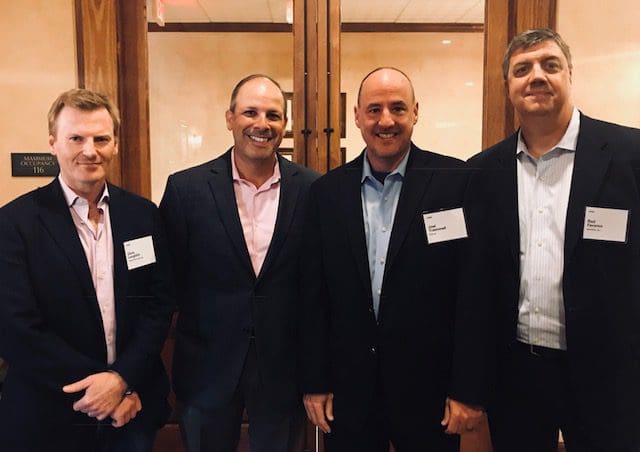Austin Finance Leadership Summit: Lessons in Entrepreneurship

At this year’s KPMG Austin Finance Leadership Summit, co-sponsored by Bridgepoint Consulting, I was honored to moderate an engaging panel titled, “Entrepreneur 2.0” with three leading Austin executives. From how their approach has changed since they began their careers to what they believe goes into building long-term success, these leaders walked us through their initial steps and missteps, sharing helpful leadership insights and stories along the way.
During the course of the conversation that ranged from navigating the changing fundraising landscape to incorporating a senior finance role, I was struck by the common threads running through their personal experiences. While these panelists represented much diversity in company types, it was interesting to discover that each of them listed developing self-awareness, building trust and rapport with employees as well as learning to integrate work and personal life at the top of their list of critical entrepreneurial skills.
HERE ARE A FEW KEY TAKE-AWAYS FROM THE DISCUSSION:
Getting started: know why to make the first leap
Addressing a packed house of financial leaders, Rod Favaron, CEO of Spredfast, a fast-growing social media software company, kicked off our discussion by stating he became an entrepreneur because he simply wasn’t interested in working for someone else. Chris Loughlin, CEO of Digital Pharmacist Inc., shared that he followed the sage advice of a divisional executive at his first organization, who advised him to start his own company if wanted to be boss by age 30.
Both he and Joel Trammel, CEO of Black Box, a leading digital solutions, agreed that some of their early success was being in the right place at the right time; Chris graduated with a programming degree at the start of the dot-com boom, while Joel had the opportunity to watch and learn as his two older brothers navigated engineering careers in a changing job market. “When I saw them having to pick up and move every two or three years, I realized I didn’t like the idea of not having control of my destiny.”
Early mistakes are inevitable as entrepreneurs begin their own ventures. For Chris, it was failing to take advantage of a stock squeeze at an early startup. Rod admitted spent too much money too quickly before learning to temper his entrepreneurial optimism, and added that the biggest thing he didn’t understand starting out was the level of support that exists in bigger companies. “When you jump in and do this from scratch,” he said, “it’s a real shock to the system.”
Joel said that when he was right out of school, he valued analysis, the numbers, as most important. “Now I’d tell you it was the people – and I wish I’d known that sooner.”
Funding and investments: be ready for anything
The three panelists have worked with a wide range of investors over the years, from venture capital firms to retirees. When I asked Rod what he’d learned from raising money for his business, he said that confidence and belief in the project are key. And when is it time to start? “When you know enough to spend the next few years of your life fundraising for it. The other time is when you run out of money, which can seem like always.” Joel stressed that fundraising doesn’t necessarily get easier the second time around, sharing that he raised $11 million from a VC firm for his first company, then never raised a dime that way again. He now relies on a mix of angel investors, friends and family, and his own pocket.
Chris agreed that while raising VC funds today can be difficult, the helpful advice and access to other investors he’d received while recently working with an Austin-based firm made it worth the effort. He also shared that while most entrepreneurs invest locally, extending fundraising to both coasts and to major US cities can help.
Leadership: build trust and fail fast
Bringing in a senior finance role is a big step for any growing company. What’s the right time? In large technology companies with high expectation around the financial function, that time may be right up front. In the company where he had $11 million to spend, Joel said that his first two hires were financial executives.
A good working relationship between the CEO and CFO is also important. A strong CFO can stand up to the CFO and provide crucial checks and balances, as well identify any potential problems or “clean up any hairballs” in a business that has just changed leadership. For instance, there was the time a newly hired CFO discovered that a founding employee had placed the A-round financing for the small startup in a personal checking account he shared with his wife.
A number of audience questions highlighted the need for honest, open leadership from entrepreneurs, especially when handling mistakes. Rod assures his teams that he’ll react no differently to bad news than to good news, so he can be sure the bad news is brought to light. “If you overreact, you’ll never hear about a mistake again. It’ll be buried or spun, or it never happened, or it’ll be someone else’s fault.” Similarly, Joel said he draws employees a diagram of a ship and a waterline. “They can make the decisions – and the mistakes – for anything above the waterline. But for anything that could sink the ship, I expect them to consult me first.”
It’s also worth remembering the value of mistakes to an organization, Chris said. “I don’t think there are mistakes; there are failures. And you want to fail fast. Without failure, there’s no innovation, no sparks.”
When asked how they balance exit planning versus day-to-day operations, all three panelists said they run their companies as though they’ll own them forever (“or else you will,” Chris warned) “Exit doesn’t determine activity,” Rod said. “Your employees can tell if you’re managing to a short-term outcome.”
Personal growth and development: aim for work/life integration
Finally, the entrepreneurs on our panel acknowledged that phones now make it virtually impossible to keep their work and personal lives completely separate. Instead of talking about “work/life balance,” these experts talk about integration: focusing intensely on work, but also making time for vacations, family dinners and their kids’ activities and interests. “You blend the two lives together and try to do both well.”
Bringing It All Together
Our experts wrapped up the discussion by providing some sound advice to individuals interested in starting their own companies. Their number one piece of advice was to choose projects that they can’t stop thinking about – whether that excitement stems from the potential to influence an industry as it undergoes major transformation, or from the opportunity to build a company with colleagues they work with closely and enjoy.
If you’re considering your next leap, Bridgepoint can help fuel your business for growth. Contact us to see how our seasoned team of financial consultants can provide financial expertise and fill critical roles as needed, working with you and your team on everything from strategic planning and fundraising to preparing for revenue recognition. Learn more about our services here.
You may also like:
- Finance Leadership Summit: Lessons from the Cloud
- Field Report: Highlights from Oracle OpenWorld 2017
As a Managing Principal for Bridgepoint Consulting, Manuel leads the firm’s growth strategy and geographic expansion initiatives. His background includes more than 20 years of experience in business process re-engineering and corporate governance across a range of public and private sector clients.




